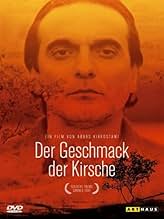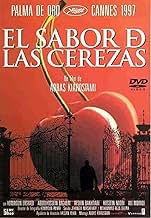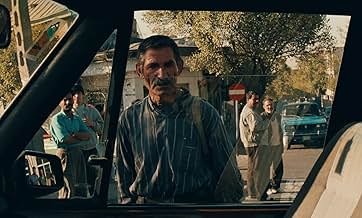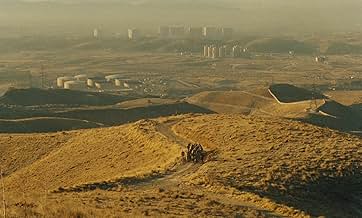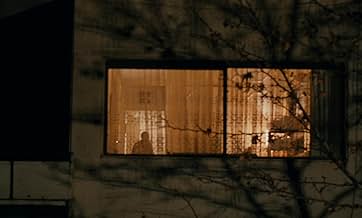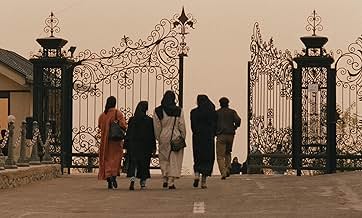Un uomo iraniano guida il suo camion alla ricerca di qualcuno che lo seppellirà silenziosamente sotto un ciliegio dopo che si è suicidato.Un uomo iraniano guida il suo camion alla ricerca di qualcuno che lo seppellirà silenziosamente sotto un ciliegio dopo che si è suicidato.Un uomo iraniano guida il suo camion alla ricerca di qualcuno che lo seppellirà silenziosamente sotto un ciliegio dopo che si è suicidato.
- Regia
- Sceneggiatura
- Star
- Premi
- 3 vittorie e 5 candidature totali
Recensioni in evidenza
The pace is quite slow, and the director takes no pains to explain or clarify anything. We follow a man as he tries to enlist the help of ordinary people in carrying out a dark plan. The movie is about the interactions between humans, about the joy of life - the taste of a cherry - seen through the eyes of a desperate man. Not all the questions are answered, and not all the pieces of the puzzle are filled. I guarantee you'll discuss this movie for at least several hours after you see it.
There are critics who call this kind of untouched-by-art realism genius, who say that Kiarostami is making us think, reconsider the very nature of cinema, and so on. To my mind, the message of the film-- the taste of cherry makes life worth living-- is no more or less profound than, say, Woody Allen rattling off a few of the things that make life worth living in Manhattan, or the epiphany the kid in American Beauty gets from a plastic bag. (Likewise the message that it's all only a movie. Never woulda guessed.) And critics who find such a message shallow in a piece of slick entertainment, but deep when it's in a deliberately unentertaining art film, need to reexamine their critical principles, or lighten up a little-- or at least go see again the work of real art Kiarostami alludes to in his title, Wild Strawberries, which has more depth of characterization and emotional richness in any five minutes than this manages to scrounge up in an hour and a half.
Suicide, in itself, is a ready and obvious turn-off for many viewers, probably. And coupled with the apparent treacle-like pace of the narrative and the repetitive scenes of a lone man, Badii (Homayoun Ershadi), driving in and around hills outside Tehran, this story gives a whole new dimension to the idea of going over the same ground, again and again, to prove a point. And all the while we, as viewer, are inside the auto for most of this movie, up close and very personal....
But to avoid seeing this movie would be a big mistake, in my opinion.
I say that simply because the idea of suicide has probably occurred to most people, including myself, at some time in their lives. Whether that idea was part of Kiarostami's motivation for making this movie, we will never know, of course. I dare say it occurred to him, though.
At the first frame, we're in Baddii's well-worn Range Rover as he drives, his face set, his gaze wandering here and there, searching for a likely assistant for his plan to kill himself. In sequence, he stops a variety of men - a seminarian, a young soldier, a security guard; each man and Badii converse about his need to have somebody help him to suicide, Badii describing what a helper must do. Each time, Baddi has no success until, with a blindingly quick jump-cut, an old man, Bagheri (Abdolrahman Bagheri) is in the car, a helper who finally agrees to abide by Badii's wishes.
So, after taking Bagheri to close where he lives, Badii drives off, content that he has secured a deal; rapidly, however, he drives back in a fluster, as doubts creep into his mind. Frantically, he walks around the area until he finds the old man Bagheri to seek further assurance he will indeed help Badii next morning. Somewhat annoyed, the old man again gives his solemn promise. And stalks off.
Slowly then, Badii returns to his home/apartment, makes his final preparations, makes a point of turning off all the lights as he leaves, locks the door, leaves his car, and then takes a taxi back to the cherry tree, he had previously selected, at which he will terminate his life during the night, and as thunderstorms - a much-overused trope perhaps - begin.
It is there, then, that I will leave you to find out why Bagheri decided to help, and about Badii's fate that night. And about an absolutely unexpected ending.
It's a bleak story, but one that is played out in too many ways by thousands every day, more or less in every country on the planet, probably. Perhaps then, Kiarostami is urging us to think upon that more often as we all traverse our own daily ups and downs - and especially in relation to those who are nearest. Once seen, this is not a movie to forget.
Recommended for all, except toddlers obviously. Give it eight out of ten.
Iran has a very young film industry that doesn't have the money or resources that many other film industries have. For what the Iranian film industry has at its disposal, this film is an exceptional achievement!
This film is a great example of how the expression of human beings' feelings and ideas cannot be held back by censorship. Kudos to Kiarostami for creating a very heartfelt commentary on the effects of oppression on the human soul.
Lo sapevi?
- QuizThe film was shot without a proper script, relying on improvisations.
- BlooperIn the opening scene, as Mr. Badhi is driving past laborers looking for work, the same middle-aged white haired man, wearing a checkered sweater vest, is seen twice.
- Citazioni
Mr. Bagheri: If you look at the four seasons, each season brings fruit. In summer, there's fruit, in autumn, too. Winter brings different fruit and spring, too. No mother can fill her fridge with such a variety of fruit for her children. No mother can do as much for her children as God does for His creatures. You want to refuse all that? You want to give it all up? You want to give up the taste of cherries?
- ConnessioniFeatured in Especial Cannes: 50 Anos de Festival (1997)
I più visti
- How long is Taste of Cherry?Powered by Alexa
Dettagli
- Data di uscita
- Paesi di origine
- Siti ufficiali
- Lingua
- Celebre anche come
- Taste of Cherry
- Luoghi delle riprese
- Aziende produttrici
- Vedi altri crediti dell’azienda su IMDbPro
Botteghino
- Lordo in tutto il mondo
- 11.207 USD
Contribuisci a questa pagina



